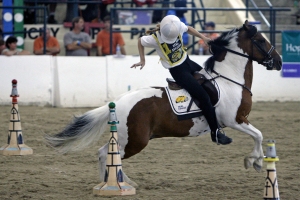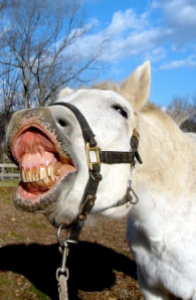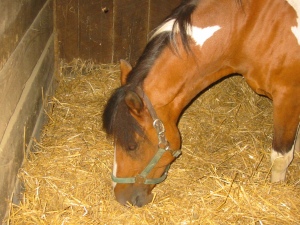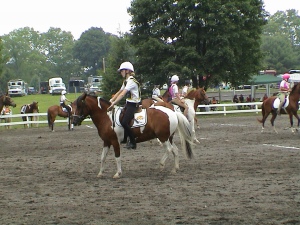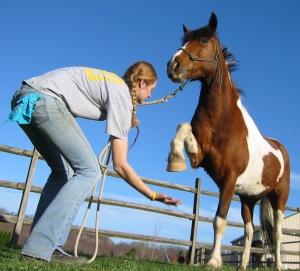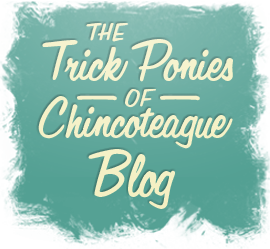Posts Tagged ‘Chincoteague
The Rear
So one of my 2010 Goals is to teach Minnow to rear. And by golly, I’m going to do it! So since its blistery cold here right now, and I’m sort of a weenie, I haven’t actually started any training yet. Do you blame me? I am sort of ashamed.
Anyway, since I haven’t actually started working on my goal yet, I thought I would share with you how I prepare to teach one of the ponies a new trick. There is a lot of thought and preparation that I do before I even begin to shape a new trick. Ok I lied a little bit there – sometimes I just head out to the farm with clicker in my hand and see what happens. Some of the best tricks I have taught the boys happened that way.
For example, Minnow’s shovel trick. I saw a sand shovel and bucket at the store, brought it to the barn, showed it to Minnow, and let him decide what to do with it. He decided to dig in the sand with it, I liked it, clicked it, and viola a new trick was born.
But for the more complicated tricks I usually like to do a bit more research. Most of the time I start out on Youtube, mostly because I am a very visual learner. In the case of the rear I searched “clicker training rear”. And this is what I came up with:
I spared you most of the not-so-great videos (many of which were a little too harsh for me). But from this collection I’ve gathered a few options for training the rear.
Option 1: Teach the rear through mimicking. I lift a leg, Minnow lifts a leg, I jump, Minnow jumps. I’ve never done mimicking with Minnow, but could be a good time to try it.
Option 2: Teach Minnow to target his knees to a target stick, start with one knee, then add two, then add height to it. Minnow loves to target, but it might take some coaxing to get him to not target with his nose, but I’m sure he could do it.
Option 3: Teach the rear on the pedestal. Reward for upward movements of the legs instead of getting onto the pedestal. Could end up with a neat trick of rearing onto the pedestal, but this requires a lot more coordination on the horse’s part.
Option 4: Capture the behavior naturally. Catch him playing out in the field and click/reward him for the rear. Capturing hasn’t worked well for Minnow (on bigger skills). I once tried capturing the lay down, but as soon as I approach Minnow to give the reward he panics and gets up. This wild born pony still has trust issues when it comes to his most vulnerable position. This option would work better with Blitz and Boomer.
 I might do a bit more research before I commit (checking my clicker training books, checking the clicker training yahoo group archives), but from just these options I came up with I think I am going to start off with Option 2 – teaching Minnow to target his knees to a stick. I chose this option because I think it will work best for MY pony. I know how he prefers to learn and I think this option will produce the best results with the least amount of stress for Minnow. If I was going to train one of my other ponies this trick I might go for a different method. Training is about tailoring everything to the specific horse you are working with. Maybe your horse is deathly afraid of whips, asking him to target a dressage whip is probably not a good idea (not to mention I probably wouldn’t even think about teaching this trick if I knew my horse had underlying issues to be worked on).
I might do a bit more research before I commit (checking my clicker training books, checking the clicker training yahoo group archives), but from just these options I came up with I think I am going to start off with Option 2 – teaching Minnow to target his knees to a stick. I chose this option because I think it will work best for MY pony. I know how he prefers to learn and I think this option will produce the best results with the least amount of stress for Minnow. If I was going to train one of my other ponies this trick I might go for a different method. Training is about tailoring everything to the specific horse you are working with. Maybe your horse is deathly afraid of whips, asking him to target a dressage whip is probably not a good idea (not to mention I probably wouldn’t even think about teaching this trick if I knew my horse had underlying issues to be worked on).
And as a side note – for now I only plan to teach Minnow how to rear. Minnow is retired from riding due to a diagnosis or ringbone (equine arthritis) in 2008, so I run no risk of having a rearing pony when I stick someone else on to ride him. I believe at 6 and 7 years old, Blitz and Boomer are still too young and immature to learn this trick. I’m sure they would take advantage of their new and fun skill and I would end up with a problem. My equine sport of Mounted games is an emotionally intense sport for horses that is prone to bring on rearing due to the adrenaline horses experience – I definitely don’t want to advocate this trick during competition. So that being said, Minnow will be the only rearing pony, atleast for a while. 🙂
-KD
www.ponypaintings.com
Please do not attempt any of these tasks at home without the help of a professional. I am not responsible for any harm or injury that may occur.
Get to Know Them
I’ve added a new page to the blog – all about getting to know the Trick Ponies of Chincoteague. So pop on over here for names/photos/stats on all 3 trick ponies. There are also links to the full bios for each pony – so you can learn a little bit about how each pony came to live with me.
I also added a sub page for the Trick Pony Friends – which includes the Dachshund of course, my retired Dressage horse, Nitro, my sister’s horse and the Dachshund’s best friend, Trooper.
Hope you enjoy learning a little more about the menagerie of animals that have fallen into my home and my heart and give me something to write about each day.
Where could he be?
Just had to share this cute video of the Dachshund.
Ammo, we all know you are cute, but please stop destroying your dog beds.
Love, Kyley
A Little Rolly Polly
I only have a few photos to share with you today. These winter photos were taken in 2007 while Minnow and the rest of my herd were living at a friends farm while we awaited construction to begin on our farm. Rare shots of Minnow rolling on the frozen ground – he’s super camera shy especially when in his most vulnerable position of being on the ground. Enjoy!
My Journey with Minnow
Since I’m on a looking back kick lately I thought I’d delve into the past a little more today. The day I’m thinking of was an extremely important day for me – its the day Chincoteague Minnow came to live with me.
I had actually met him several weeks before he came to live with me. He had been trailered out to a mounted games practice I was attending so that I could try him. When I saw his fat little body waddle off the trailer I instantly fell in love. I was warned he had a bucking problem – an extreme bucking problem – as in every other stride was with intent to dump. So as I trotted around the arena I suddenly felt Minnow start to bottle up his energy for an attempt to dump me, I gave him a tap on the butt and sent him forward before he had a second to think about it. He never tried to buck with me again. As I circled the arena I could feel Minnow bottling up his energy – he desperately wanted to let it all out – which led me to believe he had the speed I needed for mounted games. I really should of recognized he was good at holding in his emotions.
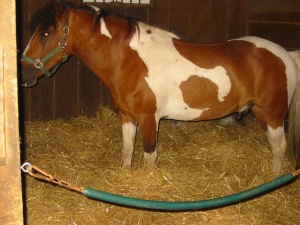 I didn’t even really need to ride him that day. The second I laid eyes on him I knew I would take him home.
I didn’t even really need to ride him that day. The second I laid eyes on him I knew I would take him home.
On June 30, 2003 I headed out to pick Minnow up. His owners were sad to see him go, but knew I would take excellent care of him.
When I got him home I decided to take him for a short ride in the arena. I should have known then that he was going to be the most challenging horse I had ever met. He kept atleast 5 feet between him and any object we passed in the ring, including cones, poles, and jumps. Anything I showed him he pretended wasn’t there – its like he was in denial about being faced with something scary.
 I had a few short months before I was set to leave for college so I got started training him right away. We did dressage work, took lessons and I introduced him to the games equipment. He seemed like the dream pony as he calmly adapted to everything I presented him with.
I had a few short months before I was set to leave for college so I got started training him right away. We did dressage work, took lessons and I introduced him to the games equipment. He seemed like the dream pony as he calmly adapted to everything I presented him with.
As the months passed Minnow was gaining more and more experience. I was gearing him to compete competitively with me the following summer. If I had had known what I know now I would have noticed that Minnow wasn’t actually “seeing” everything I showed him. He was ignoring situations that frightened him, and he was bottling up his fear with each new situation I put him in. He didn’t trust me to keep him safe. But at 19 years old I have never met a pony like him. From my eyes I saw an adaptable little pony that seemed calm and fine in any situation I put him in. True it took him extra long with the games equipment, and it took him months to get just one step closer to it, but I had no explosions, no bucking, no fits.
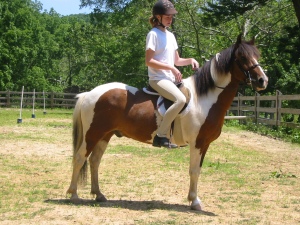 It wasn’t until June 28, 2004 that what was really going on under the surface came out. I had taken Minnow to many low-key competitions before this date. I honestly thought he was ready. I entered him in to the USPC Advanced Qualifying Games Rally.
It wasn’t until June 28, 2004 that what was really going on under the surface came out. I had taken Minnow to many low-key competitions before this date. I honestly thought he was ready. I entered him in to the USPC Advanced Qualifying Games Rally.
I think it was the noise the ultimately triggered him. The smaller competitions didn’t have the crowds that this competition had. The cheering, the yelling, the loudspeakers, the music – it pushed Minnow to his breaking point. He had always been sensitive to sounds and I think this day they just pushed him over the edge. After a year of bottling up his fears they were finally released. I had on my hands a pony that was racing around the arena uncontrollably. He was bucking and rearing and there was nothing I could do to stop him except hold on for dear life. I managed to survive through the competition – barely.
I wasn’t even upset with Minnow, I was upset with myself for not recognizing his signals before. The turning of his head to avoid looking at scary objects, the complete avoidance of anything new.
Looking back now I’m sort of glad it all happened. I may never have recognized his distress if this hadn’t happened. I would have never searched for new training methods, I would have never discovered clicker training.
After the competition one of my childhood trainers approached me. She had seen Minnow in the arena and thought she could help us. She mentioned she was starting to learn more about the Parelli method, and natural horsemanship, and she thought she could help Minnow. That summer I began retraining Minnow to trust me. We experimented with the Parelli method and made great strides to become better partners. Slowly I was chipping away at Minnow’s wall. The wall that was put up after a life that had once been filled with distrustful humans, neglect, and suffering. Each day I saw a little bit more of his true personality come out.
By year 2 Minnow was more trusting but we still weren’t there yet. We still had our uncontrollable rides and he still avoided the scary stuff – but I saw improvement. I was starting to feel a little discouraged again, so by the end of the year I found myself searching for any and all new training methods. The Parelli was moving a little too slow for me and I wasn’t sure it was REALLY getting through to Minnow. Enter the first Trick Training book I ever owned, Trickonometry by Carol Fletcher.
It was January and I was teaching Minnow to give me a kiss. I watched as he actively began THINKING about what I was asking him. He started experimenting. How do I get that food, if I do this will she give it to me, if I touch that will I get more? After about 20 minutes Minnow had learned his very first trick.
When I went to the barn the next day I was greeted by a bight eyed pony that looked generally HAPPY to see me. He WANTED to learn more. I quickly recognized that I had stumbled across something that made Minnow want to learn, and want to be with me. I decided to take him to college with me that semester so that I could delve a little more into this trick training. In the beginning I merely saw it as a way to get Minnow interested in me, which it did. He started to look forward to my visits and I was having so much fun teaching him to shake hands, pick up objects and even bow.
After several months I finally realized how I could use this training in my riding. Not only was it improving our relationship, but it was creating a language between us. I started using it to teach Minnow how to play each mounted games race. I even began using my new found reward method to teach him a western stop among many other useful tools. By the next spring I had discovered clicker training and Minnow and I were well on our way to a relationship full of trust and understanding.
Looking back these 7 years I barely remember how Minnow used to be. I now use him as an example to my younger horses, who seem to learn merely by watching Minnow. I am always amazed at how far he’s come. He’s now truly MY pony and I’m really HIS special person. He’ll always be the pony that taught me the language of horses.

